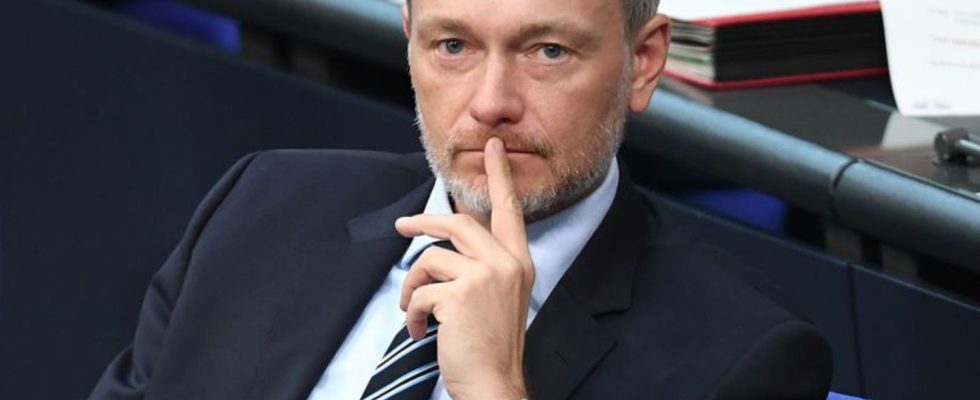After the budget dispute is before the budget dispute. At least that is to be expected when the traffic light coalition now negotiates the budget for 2025. Opposites collide again.
Here we go again: As soon as the federal budget for the current year has been decided after a hard struggle, the haggling over the budget for 2025 begins these days. Finance Minister Christian Lindner (FDP) wants to set tight limits for his ministerial colleagues this time – because there is already a gap there is a billion-dollar gap in the plans.
First of all, Lindner’s new budget state secretary, Wolf Reuter, has to get to work: The 39-year-old wants to convince his colleagues responsible for tougher austerity measures.
Will the negotiations be as tough as last year?
In any case, it shouldn’t get much easier – even if there is no surprise effect. Last year, the Federal Constitutional Court’s ruling just days before the planned budget resolution completely disrupted an already difficult process.
This time everyone is prepared for a tough fight right from the start. “Our country is facing major economic and financial policy challenges. There is a clear need for structural consolidation in the federal budget for the future financial years,” Reuter warned the other ministries in a letter in February. Translated, this means: We have to save.
Some put the gap in the budget at 15, others at 25 or even 30 billion euros. It is also not to be expected that the economic situation will “result in relief effects for the federal budget,” Reuter wrote to his colleagues. The persistently weak economic situation is now also having an impact on tax revenues.
Economist Jens Südekum still warns the traffic light government against an austerity budget. Something like that would be “economically and politically wrong,” he says. “We must not now stumble into such an austerity budget just because there are fundamentally different views between the individual partners within the traffic light coalition in Berlin.” The scientist sees problems not only in the core budget, but also in the KTF climate fund. “In other words, that means we are running into big budget holes,” predicts Südekum.
How does Lindner want to assert himself?
Last year, Lindner even involved Chancellor Olaf Scholz (SPD) in the stalled talks with the ministries because they did not want to embark on austerity measures. This time the FDP leader is tackling the process differently from the start. The preparation of the budget will be “fundamentally different from those in previous years,” announced Reuter. The Ministry of Finance does not want to negotiate basic budget figures as usual, but rather sets spending caps for the houses straight away. The aim is to prevent the ministries from making high demands again, which then have to be negotiated down. However, it is unclear whether Lindner’s colleagues will accept the changed procedure.
Where are cuts coming?
The Finance Minister has already stated that spending needs to be prioritized more strongly than before. Different methods are conceivable to save the necessary resources. For example, each department could reduce a percentage of its spending across the board. “Every specialist ministry must now deliver real savings and question entire projects and tasks,” said the Parliamentary Managing Director of the FDP parliamentary group, Torsten Herbst, to “Bild”.
But that seems unlikely, because Scholz has already made it clear that neither the defense budget nor social spending should be affected. Lindner, on the other hand, suggested a multi-year moratorium on social spending and subsidies in order to be able to invest more money in defense. DGB leader Yasmin Fahimi warned of cuts in social benefits. In times of upheaval, one should not provoke further social upheaval through savings debates.
Where will the money come from then?
The SPD and the Greens continue to flirt with the federal government taking out more loans. To do this, the debt brake would have to be suspended again. The DGB, many social associations and some economists are also in favor of this. They believe that such an exception can be justified by the exceptional support for Ukraine and the refugees.
The debt brake anchored in the Basic Law only provides for a very limited net borrowing, but can be suspended in the event of natural disasters or other exceptional emergencies. This was the case, for example, during the corona pandemic. Lindner and his FDP currently see no basis for this. And they warn that Germany would risk its good credit rating and burden future generations with high interest payments through new debt.
Are there also areas that should receive more money?
Defense Minister Boris Pistorius (SPD) sees a great need for investment in the Bundeswehr and wants a higher defense budget. Lindner wouldn’t be averse to that either – but only if appropriate savings are made elsewhere in the household. The finance minister also believes a new package to support the weak economy is necessary, including a reduction in the tax burden.
Economics Minister Robert Habeck (Greens) also wants this, but the two pursue fundamentally different philosophies on key issues. On the one hand, it’s about financing: Lindner wants to stay within the framework of the debt brake, Habeck wants a special fund, i.e. a debt-financed special pot. In addition, the Greens tend to favor subsidies, while the FDP relies on incentives, for example through lower taxes. However, a tax reform will hardly receive approval from the coalition partners if the top tax rate is not addressed.
Can the dispute blow up the coalition?
Budget negotiations are always explosive because it becomes clear that the coalition partners pursue very different goals. The FDP in particular is said to have its finger on the trigger. But given the current poll numbers, all three coalition partners have to ask themselves what they would gain by ending the coalition.

